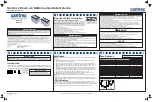
1.
DETAILED SPECIFICATIONS:
Specifications may change without notice in the interests of product improvement
2.
CONNECTION DIAGRAM:
3.
IMPORTANT SAFETY INSTRUCTIONS:
WARNING
– Risk of explosive gases. Working in the vicinity of a battery is dangerous. Batteries
generate explosive gasses during charging. Keep the battery and charger away from open flames and
sparks.
CAUTION
– Charge only rechargeable vented / flooded, maintenance free, low – maintenance, deep
cycle or leisure, sealed gel and / or recombination batteries.
Never recharge dry cell or non-rechargeable or defective batteries. These may explode and cause
personal injury and property damage. If you are uncertain as to the type of battery you are attempting
to charge, or the correct procedure for checking the battery’s rate of charge, contact your battery
supplier or battery manufacturer.
Always follow the battery manufacturer’s instructions
.
Battery chargers contain switches and circuit breakers that produce arcs or sparks. Use the charger in a
well ventilated room only.
This appliance is not intended for use by persons (including children) with reduced physical, sensory
or mental capabilities, or lack of experience and knowledge, unless they have been given supervision
or instruction
concerning the us of the appliance by a person responsible for their safety.
Children should be supervised to ensure that they do not play with the appliance.
4.
INSTRUCTIONS:
Connect and disconnect battery leads only when AC supply cord is disconnected.
Charge batteries in a dry well ventilated area only.
Do not obstruct the flow of air through the charger cabinet.
Never place the charger on a heated surface
If the supply cord is damaged, it must be replaced. Do not operate the charger with a damaged cord
or plug. Have the damaged cord or plug replaced immediately.
The charger must not be exposed to liquids in any form. Use indoors only.
Charger
Input
Voltage
Input
Current
Current
Selector
Output
Voltage
Output
Current
AutoPro 50 12V
230Vac
6,2A
-
12Vdc
50Adc
AutoPro 50 24V
230Vac
10,5A
-
24Vdc
50Adc
AutoPro 100 12V
230Vac
10.5A
-
12Vdc
100Adc
5.
PERSONAL PRECAUTIONS:
Wear complete eye protection, clothing protection and wear rubber soled shoes. When the ground is
very wet or covered in snow, wear rubber boots. Avoid touching the eyes while working with
batteries.
Battery acid is corrosive. If battery acid contacts skin or clothing, wash immediately with soap and
water or a solution of Bicarbonate of Soda and water. If acid enters the eye, immediately flush eye
with running cold water for at least 10 minutes and then consult a doctor.
NEVER smoke or allow a spark or flame in the vicinity of a battery or engine.
Be careful not to drop a metal tool onto the battery. It might spark or short circuit the battery or other
electrical part that may cause an explosion.
Before working with any battery, remove any jewellery. A battery can produce a short-circuit
current high enough to weld such items causing severe burns.
NEVER charge a frozen battery – thaw it out first. Charging will then be safer and more efficient.
6.
CHARGING AUTOMOBILE BATTERIES:
Ensure that the mains supply to the charger is
disconnected
before connecting any battery terminals.
Connect the RED clamp to the positive terminal of the battery and the BLACK clamp to the negative
terminal of the battery.
Connect the charger to the mains supply and switch ON.
After charging, disconnect charger from mains supply first before disconnecting any battery charger
clamps.
7.
AUTOMATIC CHARGERS FUNCTIONAL INDICATORS:
Hawkins Automatic Chargers has 3 LED lights that continuously monitor and displays the state of
charge of the battery.
OPERATING MODE
RED
YELLOW
GREEN
Power on
ON
OFF
OFF
Bulk Charge Phase
ON
ON
OFF
Battery Full - Float Phase
ON
OFF
ON
During the Bulk Charge Phase, the majority of the energy is replaced until a pre-set voltage level has
been reached. The charger then enters the Absorption Charge Phase where it holds the voltage constant
while reducing the output current. This phase is set to run until the current drops to 6A. After the
Absorption phase is complete, the charger then enters the Float Charge Phase.
This charger will not start charging unless the battery has at least 10V on it for a 12V battery and
20V for a 24V battery.
WARNINIG!
– A sign of overcharging is a battery that is hot to the touch.. This is an indication of a
problem battery and/or an incorrect match between the battery and charger. A hot and/or a bubbling
battery must not be left unattended. If the condition persists, disconnect the charger and have the
battery checked at your local automotive service centre.
Hawkins Automatic Chargers may be left connected to a battery.




















